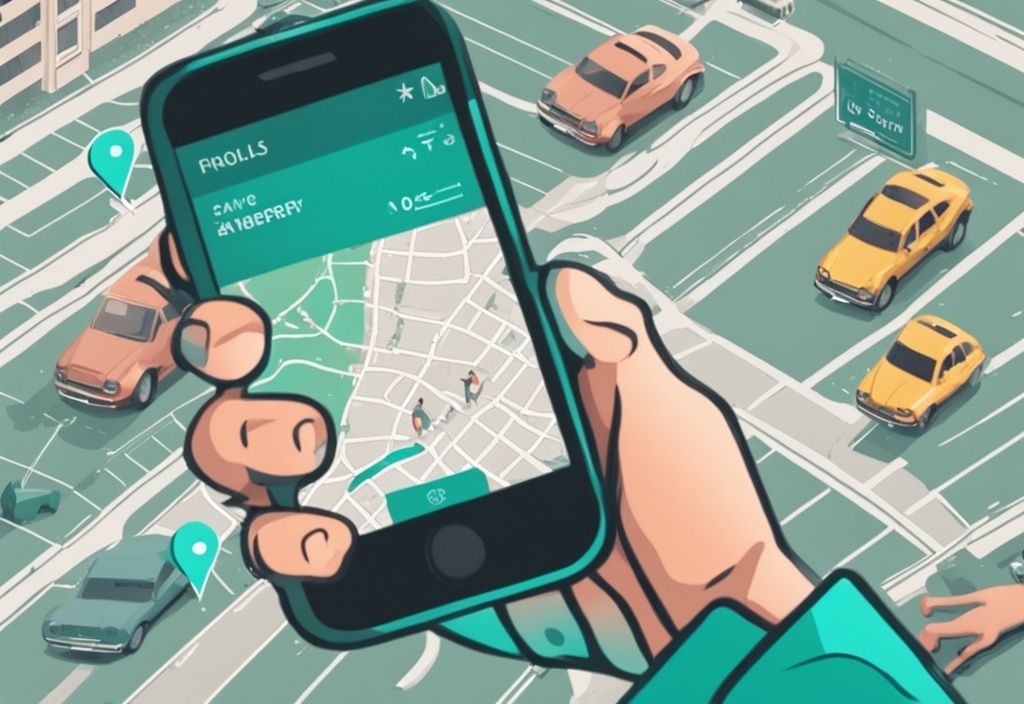Efficient Guide: How to Track My Car if Stolen – Recovery Tips
Ever wake up to find your car missing from your driveway? I know the feeling. It’s as if your heart drops to your shoes. But what if I told you there’s a way to track your stolen car? Intriguing, right?
In this guide, we’ll explore how to confirm the theft and use modern technology to track your stolen vehicle. With car thefts rising, it’s crucial to know how to act swiftly and increase your chances of getting your car back.
So, are you ready to take control and be prepared for the worst-case scenario? Let’s dive in and discover how to turn the tide in your favor when your car is stolen.
Immediate Actions to Take When Your Car Is Stolen
Confirm the Car Is Stolen
Before panicking, ensure that your car is indeed stolen and not merely misplaced or borrowed. Begin by checking with family members or friends who might have taken the vehicle without informing you. This simple step can save you a lot of unnecessary stress and confusion.
Next, reach out to local authorities or towing companies to confirm that your car hasn’t been towed due to parking violations or other issues. This can often be the case, especially in urban areas with strict parking regulations.
If these steps don’t yield results, review footage from nearby security cameras. This includes cameras at petrol pumps, car parking stands, and road cameras. If the car was stolen from your home, make sure to check your home security cameras, including those in the garage and on the porch. Analyzing this footage can provide critical clues about the theft and the identity of the thief.
Report the Theft to the Police
Once you have confirmed that your car is indeed stolen, contact the local police department immediately. Prompt reporting increases the chances of recovering your vehicle. When you speak to the police, provide detailed information about your car, including the Vehicle Identification Number (VIN), model, color, and license plate number. This information is crucial for the police to identify your vehicle quickly.
Additionally, make sure to report the license plate number to the police. This allows them to flag your vehicle for local patrol cars and surveillance cameras, increasing the likelihood of spotting the stolen car.
Provide Detailed Information to Law Enforcement
To assist law enforcement in their efforts to recover your stolen car, share all relevant details about the vehicle. This includes any distinguishing features or modifications that make your car unique. For example, custom paint jobs, unique decals, or aftermarket parts can help in identifying your car more easily.
If your vehicle has any pre-installed tracking devices or security systems, inform the police about these. These systems can provide real-time location data, significantly aiding in the recovery process.
Additionally, check the Vehicle Identification Number (VIN) maintenance log. Sometimes, thieves may service the car after stealing it. By searching the VIN number online, you can see if the car has been serviced since the theft, providing another potential lead for law enforcement.
By following these steps, you can maximize your chances of recovering your car and ensure that you are taking all necessary actions on how to track your car if stolen.
Using Technology to Locate Your Stolen Car
Check for Pre-Installed GPS Trackers
One of the most effective methods on how to track my car if stolen is by utilizing pre-installed GPS trackers. These devices can be tracked via corresponding apps, allowing you to pinpoint the car’s exact location in real-time. Many modern vehicles come equipped with GPS devices from companies like Lojack or One Star.
If your car has one of these systems, you can activate the tracker through the associated app to locate your vehicle. This method is invaluable for quickly recovering a stolen car and providing precise location data to law enforcement.
Utilize Bluetooth Tracking Systems
Another effective strategy for how to track my car if stolen is to use Bluetooth tracking systems. These systems work by connecting to your phone, providing a reliable way to track your vehicle’s location.
If your car has a built-in or externally installed Bluetooth tracker, you can use apps like Find My iPhone or AlfredCircle to locate it. This method is particularly useful if a phone was left in the vehicle during the theft, as the Bluetooth connection can help you track the car’s movements. Ensuring that your car is equipped with a Bluetooth tracking system can significantly enhance your chances of recovery.

Use Find My iPhone or AirTags
If you’re wondering how to track my car if stolen and a device was left inside the vehicle at the time of the theft, services like Find My iPhone or AirTags can be extremely helpful. These tools allow you to track the location of the device, and consequently, your car.
Additionally, utilizing motion detection features on security cameras can provide immediate notifications of any suspicious activity around your vehicle. This dual approach not only helps in tracking the stolen car but also in gathering crucial evidence that can assist law enforcement in the recovery process.
Understanding Car Tracking Systems
Vehicle tracking systems have become a crucial tool in combating the rise in car thefts. These systems not only provide peace of mind but also significantly increase the chances of recovering a stolen vehicle. Many insurance companies even offer discounts for vehicles equipped with tracking systems, potentially lowering your premiums. Knowing how to track your car if stolen can save you from the stress and financial burden of losing your vehicle.
The Importance of Vehicle Tracking
In recent years, car thefts have been on the rise, making vehicle tracking systems increasingly essential. These systems offer numerous benefits, providing not only peace of mind but also significantly enhancing the chances of recovering a stolen vehicle. Additionally, many insurance companies offer discounts for vehicles equipped with tracking systems, potentially reducing your premiums. Knowing how to track your car if stolen can save you from the stress and financial burden of losing your vehicle.
Different Types of Car Tracking Systems
There are various car tracking systems available on the market, each with unique features and capabilities.
GPS Tracking Systems: These systems use satellite signals to pinpoint the exact location of your vehicle. They provide real-time updates and are highly reliable, making them a popular choice for car owners.
OBD Trackers: OBD (On-Board Diagnostics) trackers plug into the car’s diagnostics port, offering real-time tracking and diagnostic information. These devices are useful for both tracking the vehicle and monitoring its health.
VHF Trackers: VHF (Very High Frequency) trackers use radio frequency signals to locate vehicles. They are particularly effective in areas where GPS signals may be weak or non-existent, providing an additional layer of reliability.
How to Install a Car Tracking System
Installing a car tracking system can be straightforward if you follow these steps:
- Choose the Right Tracker: Select a tracking system that suits your needs and budget.
- Find a Hidden Location: To prevent thieves from finding and disabling the tracker, choose a concealed spot in your vehicle.
- Install the Tracker: Follow the manufacturer’s instructions to install the device. This may involve connecting it to the car’s power supply or plugging it into the OBD port.
- Activate the Tracker: Once installed, activate the tracker using the corresponding app or software to start monitoring your vehicle.
Choosing a hidden location for the tracker is crucial to ensure it remains undetected by potential thieves.
Using a Tracking System to Locate a Stolen Car
Once your tracking system is installed and activated, it can be an invaluable tool if your car is stolen. Here’s how to use it effectively:
- Access Tracking Information: Log into the tracking app or software to view the real-time location of your vehicle.
- Contact Law Enforcement: Immediately inform the police and provide them with the tracking information. This allows law enforcement to locate and recover your vehicle safely.
- Avoid Confrontations: Do not attempt to recover the vehicle on your own, as this can be dangerous. Always rely on law enforcement to handle the situation.

Using a car tracking system not only helps in locating a stolen vehicle but also ensures that you can provide precise information to the authorities, increasing the likelihood of recovery.
The Role of Law Enforcement and Insurance Companies
When your car is stolen, both law enforcement and insurance companies play crucial roles in the recovery process. Understanding how they use tracking information can significantly improve your chances of getting your vehicle back.
How Law Enforcement Uses Tracking Information
When your car is stolen, law enforcement agencies utilize tracking information to efficiently locate and recover the vehicle. Tracking systems like GPS or VHF provide real-time location data, enabling police to pinpoint the car’s exact whereabouts. This information is crucial for directing patrol units and coordinating with other agencies to intercept the stolen vehicle quickly. Additionally, tracking data helps in identifying theft patterns and potentially dismantling larger criminal networks involved in vehicle theft.
It’s vital to remember that attempting to recover the vehicle on your own is highly discouraged. Confronting thieves can lead to dangerous situations, including physical harm or legal complications. Law enforcement professionals are trained to handle such scenarios safely and effectively, ensuring that the recovery process is conducted without unnecessary risks.
Informing Your Insurance Company
Having a tracking system installed in your vehicle can potentially lower your car insurance premiums. Many insurance companies recognize the added security and increased chances of recovery that tracking systems provide, offering discounts as an incentive for their installation.
To take advantage of these discounts, you need to inform your insurance company about the tracking system. Provide them with detailed information about the type of tracker installed, its capabilities, and any relevant documentation or proof of installation. This not only helps in securing a lower premium but also ensures that your insurance provider has all necessary information to support you effectively in case of a theft.
By proactively communicating with both law enforcement and your insurance company, you improve the chances of recovering your stolen vehicle and potentially reduce your insurance costs.
Legal Considerations and Choosing the Right Tracking System
When considering how to track my car if stolen, it’s crucial to familiarize yourself with the legal aspects of using car tracking systems. Different regions have varying laws and regulations regarding the installation and use of tracking devices. Understanding these local laws ensures that you remain compliant and avoid potential legal issues.
Understanding Local Laws and Regulations
When thinking about how to track your car if stolen, it’s essential to get a grip on the legal landscape. Different areas have different rules about installing and using tracking devices. Knowing these laws helps you stay on the right side of the law and avoid any nasty surprises.
For example, in some places, it might be illegal to put a tracking device on a car without the owner’s permission. This is especially important if you’re thinking about tracking a car you don’t fully own. Also, some regions have privacy laws that control how tracking data is collected and used. Ignoring these laws can lead to big fines or legal trouble. Additionally, some states or countries require tracking devices to meet specific standards or certifications. For more information on how technology standards evolve, you might want to check out our comparison of WiFi 5 vs WiFi 6. Before buying a tracking system, make sure it follows local rules. Talking to a legal expert or local authority can clear up any questions you have.
Reviewing and Comparing Tracking Systems
Choosing the best car tracking system involves several considerations to ensure it meets your needs effectively. Here are some tips to guide you through the selection process:
- Cost: Think about your budget and compare the costs of different tracking systems. Some basic models are cheap, but advanced systems with real-time tracking and extra features might cost more.
- Ease of Installation: Decide if you can install the system yourself or if you need a professional. Some systems are plug-and-play, while others might need a more complicated setup.
- Tracking Capabilities: Look at what the device can do. GPS systems give precise location tracking, while OBD trackers offer real-time diagnostics and location data. VHF trackers are handy in areas with weak GPS signals.
- Customer Reviews: Check out customer reviews and ratings to see how reliable and effective the tracking system is. Real-world experiences can give you a good idea of how well the product works.

By considering these factors, you can make an informed decision on the most suitable tracking system for your needs, ensuring that you are well-equipped to track your car if stolen.
FAQ
What should I do first if my car is stolen?
– First things first, confirm the car is actually stolen. Check with family members or anyone who might have borrowed it. Then, report the theft to the police immediately. Provide them with detailed information about your car—every bit helps.
Can I track my car if it doesn’t have a GPS tracker?
– Absolutely. If you left a device like an iPhone or an AirTag inside the vehicle, you can use services like Find My iPhone. Also, make sure to report the theft to the local police department with as much detail as possible about the vehicle and its last known location.
How can a car tracking system help in recovering my stolen car?
– A car tracking system is a game-changer. It provides real-time location information, which significantly boosts the chances of recovery. Law enforcement can use this tracking data to pinpoint and recover your stolen vehicle quickly.
Are there any legal issues with using car tracking systems?
– Yes, there are. It’s crucial to understand local laws and regulations regarding tracking devices. Make sure your tracking system complies with these legal requirements to avoid any legal troubles down the road.
Will installing a car tracking system lower my insurance premiums?
– Many insurance companies do offer discounts for vehicles equipped with tracking systems. Inform your insurance provider about your tracking system to take advantage of these potential savings.
Conclusion
Tracking a stolen car involves a series of immediate and strategic actions. First and foremost, confirm that your vehicle has indeed been stolen by checking with family members, friends, and local authorities. Utilize nearby security cameras for any footage that might provide clues.
Once confirmed, report the theft to the police without delay. Provide them with detailed information, including the Vehicle Identification Number (VIN), model, color, and license plate number. This information is crucial for flagging your vehicle in local surveillance systems and increasing the chances of recovery.
Technology plays a pivotal role in locating stolen vehicles. If your car has a pre-installed GPS tracker, use it to find its location via the corresponding app. Additionally, Bluetooth tracking systems and services like Find My iPhone or AirTags can be invaluable, especially if a device was left inside the vehicle at the time of the theft.
Understanding the different types of car tracking systems available can significantly improve your chances of recovering a stolen car. GPS tracking systems, OBD trackers, and VHF trackers each offer unique benefits and capabilities. Choose a system that best fits your needs and ensure it’s discreetly installed to prevent tampering by thieves.
Law enforcement agencies rely heavily on tracking information to locate and recover stolen vehicles. It’s crucial to provide them with accurate and up-to-date tracking data. Additionally, informing your insurance company about the tracking system can potentially lower your premiums and facilitate a smoother claims process.
In conclusion, knowing how to track your car if stolen involves immediate action, leveraging technology, and understanding the roles of law enforcement and insurance companies. Consider installing a car tracking system for peace of mind and a higher likelihood of recovering your vehicle. By taking these steps, you can significantly mitigate the stress and financial burden associated with car theft.
I’m James Albright, a home security expert with over 15 years of experience, and I’m passionate about helping families protect what matters most. After serving as a police officer, I transitioned to security consulting to share my hands-on knowledge and practical tips. My mission is to make home security simple and reliable by offering clear, no-nonsense advice and easy-to-follow guides. When I’m not reviewing the latest security tech or writing, I’m out in the community leading neighborhood watch programs and, most importantly, keeping my own family safe.





Post Comment